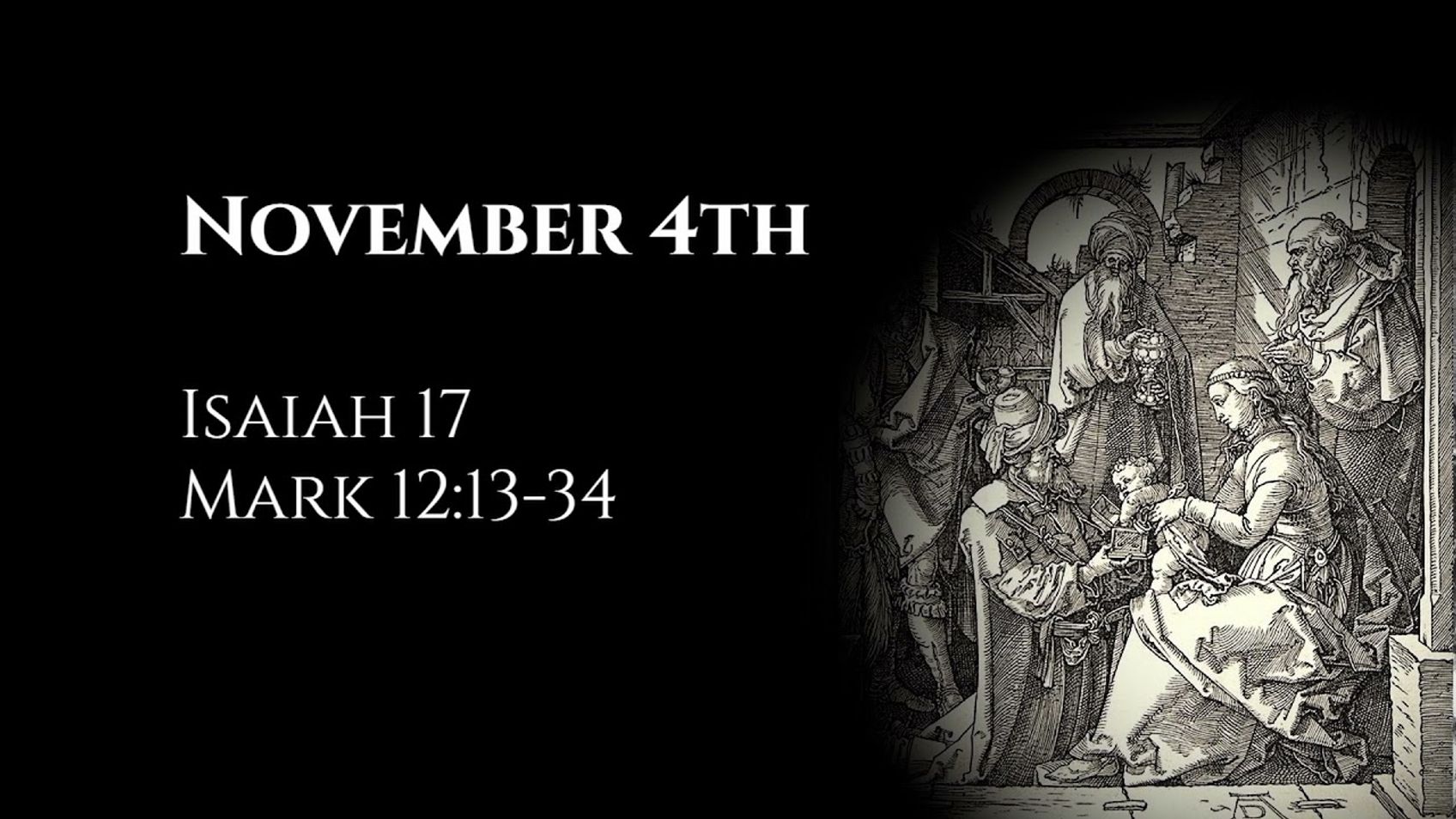November 4th: Isaiah 17 & Mark 12:13-34
November 3, 2021

Alastair Roberts
An oracle against Damascus and Israel. Scribes, Pharisees, and Sadducees question Jesus.
My reflections are searchable by Bible chapter here: https://audio.alastairadversaria.com/explore/.
If you are interested in supporting this project, please consider supporting my work on Patreon (https://www.patreon.com/zugzwanged), using my PayPal account (https://bit.ly/2RLaUcB), or buying books for my research on Amazon (https://www.amazon.co.uk/hz/wishlist/ls/36WVSWCK4X33O?ref_=wl_share).
You can also listen to the audio of these episodes on iTunes: https://itunes.apple.com/gb/podcast/alastairs-adversaria/id1416351035?mt=2.
More From Alastair Roberts
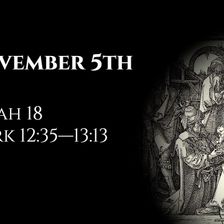
November 5th: Isaiah 18 & Mark 12:35—13:13
Alastair Roberts
November 4, 2021
Messengers to Cush. Judgment upon the Temple.
My reflections are searchable by Bible chapter here: https://audio.alastairadversaria.com/explore/.
If
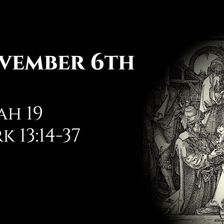
November 6th: Isaiah 19 & Mark 13:14-37
Alastair Roberts
November 5, 2021
An oracle for Egypt. The coming of the Son of Man.
My reflections are searchable by Bible chapter here: https://audio.alastairadversaria.com/explore/
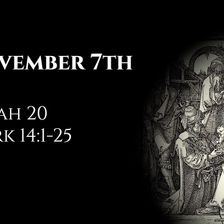
November 7th: Isaiah 20 & Mark 14:1-25
Alastair Roberts
November 6, 2021
Caution against resting on Cush and Egypt. The Last Supper.
My reflections are searchable by Bible chapter here: https://audio.alastairadversaria.com
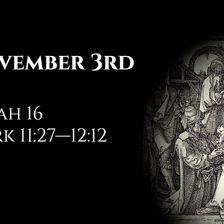
November 3rd: Isaiah 16 & Mark 11:27—12:12
Alastair Roberts
November 2, 2021
The conclusion of the oracle against Moab. The Parable of the Wicked Vinedressers.
My reflections are searchable by Bible chapter here: https://audio
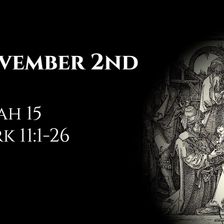
November 2nd: Isaiah 15 & Mark 11:1-26
Alastair Roberts
November 1, 2021
The oracle against Moab. The Triumphal Entry.
My reflections are searchable by Bible chapter here: https://audio.alastairadversaria.com/explore/.
If
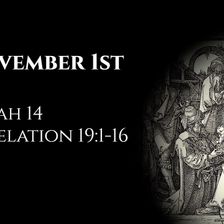
November 1st: Isaiah 14 & Revelation 19:1-16
Alastair Roberts
October 31, 2021
A taunt over the king of Babylon. The marriage supper of the Lamb.
My reflections are searchable by Bible chapter here: https://audio.alastairadversa
More on OpenTheo

What Is Wrong with Wokeness? With Neil Shenvi
Life and Books and Everything
January 19, 2026
In this timely interview, Kevin talks to Neil Shenvi about his new book (co-authored with Pat Sawyer), entitled “Post Woke: Asserting a Biblical Visio

Lora Ries: Border Security and Immigration Policy
Knight & Rose Show
December 7, 2025
Wintery Knight and Desert Rose welcome Lora Ries to discuss border security and immigration policy. They explore Biden's policy changes, like ending R

Why Does the Bible Teach You How to Be a Proper Slave Owner?
#STRask
November 13, 2025
Question about why it seems like the Bible teaches you how to be a proper slave owner rather than than saying, “Stop it. Give them freedom.”
* It s

The Heidelberg Catechism with R. Scott Clark
Life and Books and Everything
November 3, 2025
You may not think you need 1,000 pages on the Heidelberg Catechism, but you do! R. Scott Clark, professor at Westminster Seminary California, has writ

Could the Writers of Scripture Have Been Influenced by Their Fallen Nature?
#STRask
October 23, 2025
Questions about whether or not it’s reasonable to worry that some of our current doctrines were influenced by the fallen nature of the apostles, and h

Why Are So Many Christians Condemning LGB People Just Because of How They Love?
#STRask
January 15, 2026
Questions about Christians condemning LGB people just because of how they love, how God can expect someone to be celibate when others are free to marr

How Can We Know Who Is Teaching the Same Gospel Paul Taught?
#STRask
February 16, 2026
Questions about how we can know who is teaching the same gospel Paul taught, and whether or not Jeremiah 1:5 supports the idea that we pre-existed in

Why Should We Pray If God Already Knows What’s Going to Happen?
#STRask
January 29, 2026
Questions about why we should pray if God already knows what’s going to happen, how the effectiveness of prayer is measured, and whether or not things

How Can I Explain Modesty to My Daughter?
#STRask
November 27, 2025
Questions about how to explain modesty to a nine-year-old in a way that won’t cause shame about her body, and when and how to tell a child about a pre

The Making of the American Mind with Matthew Spalding
Life and Books and Everything
February 2, 2026
The United States is unique in how much attention it pays to its founding, its founders, and its founding documents. Arguably, the most famous and mos

Can You Provide Verifiable, Non-Religious Evidence That a Supernatural Jesus Existed?
#STRask
November 10, 2025
Question about providing verifiable, non-religious evidence that a supernatural Jesus existed.
* I am an atheist and militantly anti-god-belief. Ho

Christmas Cranks and Christmas Blessings with Justin Taylor and Collin Hansen
Life and Books and Everything
December 17, 2025
If you are looking for a podcast where three friends talk about whatever they want to talk about and ramble on about sports, books, and grievances, th

Prove to Me That Jesus Is Not a Created Being
#STRask
January 26, 2026
Questions about why we should think Jesus is not a created being, and what it means to say God became fully human if part of being human means not bei

Does God Hear the Prayers of Non-Believers?
#STRask
February 26, 2026
Questions about whether or not God hears and answers the prayers of non-believers, and thoughts about a church sign that reads (as if from God), “Just

What Are Some Good Ways to Start a Conversation About God with Family Members?
#STRask
October 30, 2025
Questions about how to start a conversation about God with non-Christian family members, how to keep from becoming emotional when discussing faith iss
